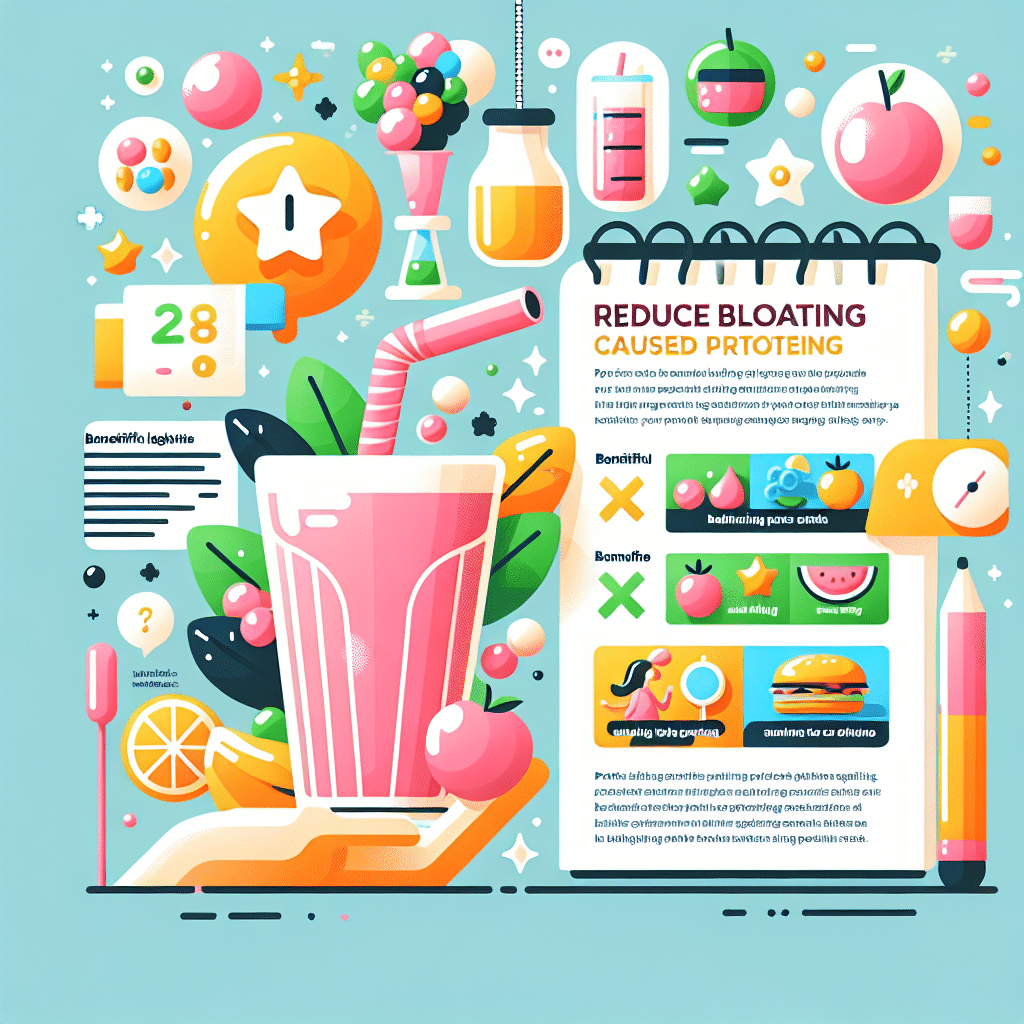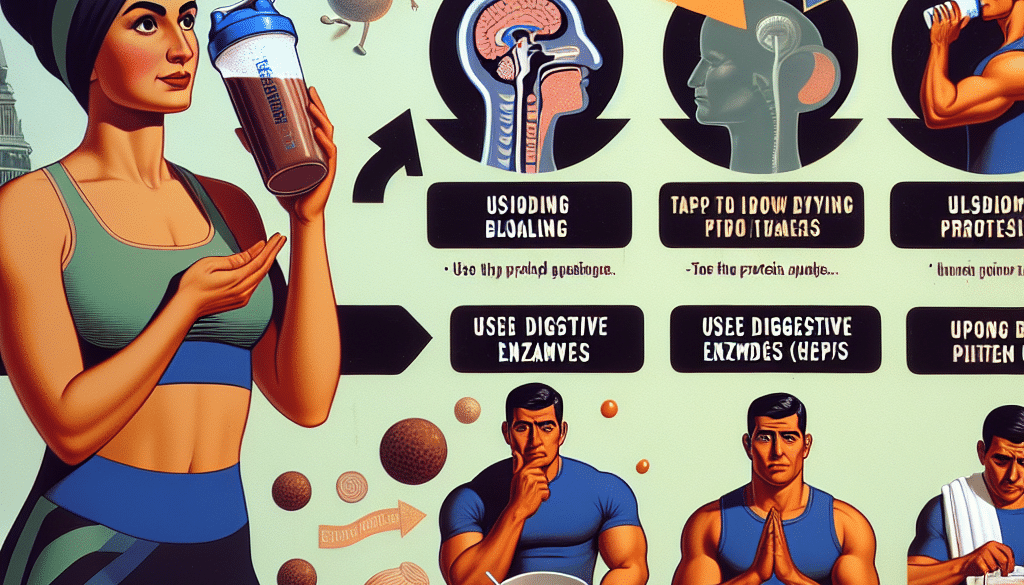Reducing Bloating from Protein Shakes: Tips & Tricks
-
Table of Contents
- Protein Shakes and Bloating: How to Minimize Discomfort
- Understanding the Causes of Bloating from Protein Shakes
- Strategies to Reduce Bloating
- Choose the Right Protein Source
- Gradually Increase Protein Intake
- Stay Hydrated
- Limit High-Fiber Additives
- Avoid Artificial Sweeteners
- Consider Digestive Enzymes
- Blend with Care
- Monitor Your Overall Diet
- Case Studies and Statistics
- Conclusion: Key Takeaways for Reducing Bloating
- Discover ETprotein’s High-Quality Protein Products
Protein Shakes and Bloating: How to Minimize Discomfort

Protein shakes are a popular nutritional supplement among athletes, bodybuilders, and those looking to increase their protein intake for various health reasons. However, a common side effect experienced by many is bloating. This discomfort can be discouraging and may even lead some to abandon their protein shake regimen altogether. Fortunately, there are several strategies one can employ to reduce or prevent bloating from protein shakes.
Understanding the Causes of Bloating from Protein Shakes
Bloating can occur for several reasons when consuming protein shakes. It’s essential to understand these causes to effectively address the issue:
- Lactose Intolerance: Many protein powders are derived from whey or casein, which contain lactose. Those with lactose intolerance may experience bloating as a result.
- High Fiber Content: Some protein shakes also include a significant amount of dietary fiber, which can cause gas and bloating in some individuals.
- Artificial Sweeteners: Many protein powders contain artificial sweeteners like xylitol or sorbitol, which can lead to digestive discomfort.
- Excessive Intake: Consuming too much protein in one sitting can overwhelm the digestive system, leading to bloating.
- Insufficient Hydration: Protein requires adequate water for digestion. Inadequate hydration can result in bloating.
Strategies to Reduce Bloating
By implementing the following tips and tricks, you can enjoy the benefits of protein shakes without the uncomfortable side effects:
Choose the Right Protein Source
Opt for a protein powder that aligns with your body’s needs and sensitivities. If you’re lactose intolerant, consider plant-based proteins such as pea, rice, or hemp protein. These are typically easier to digest and less likely to cause bloating.
Gradually Increase Protein Intake
If you’re new to protein shakes, start with a smaller serving size and gradually increase it over time. This allows your digestive system to adjust without becoming overwhelmed.
Stay Hydrated
Drink plenty of water throughout the day, especially when you consume protein shakes. Proper hydration aids in digestion and can help prevent bloating.
Limit High-Fiber Additives
If you’re sensitive to fiber, be cautious with the amount you add to your shakes. While fiber is beneficial, too much can cause bloating, especially if your body isn’t used to it.
Avoid Artificial Sweeteners
Choose protein powders without artificial sweeteners or opt for natural sweetening options like stevia, which are less likely to cause digestive issues.
Consider Digestive Enzymes
Supplementing with digestive enzymes can help break down protein more efficiently, reducing the likelihood of bloating.
Blend with Care
When preparing your shake, blend it smoothly but avoid over-blending, which can introduce excess air into the mixture and contribute to bloating.
Monitor Your Overall Diet
Ensure that your overall diet is balanced and not overly reliant on protein shakes. Whole foods should be the primary source of nutrients, with shakes serving as a supplement.
Case Studies and Statistics
Research has shown that individuals who switch to plant-based protein sources often report less bloating. For example, a study published in the “Journal of the International Society of Sports Nutrition” found that participants who consumed plant-based protein reported fewer gastrointestinal issues than those who consumed whey protein.
Additionally, statistics indicate that up to 75% of the world’s population may have some degree of lactose intolerance, which underscores the potential benefits of lactose-free protein options for those experiencing bloating.
Conclusion: Key Takeaways for Reducing Bloating
To minimize bloating from protein shakes, consider the following key points:
- Select a protein powder that suits your digestive sensitivities.
- Gradually increase your protein intake to allow your digestive system to adapt.
- Stay well-hydrated to facilitate proper digestion of protein.
- Be mindful of fiber and artificial sweetener content in your shakes.
- Explore digestive enzymes as a potential aid for protein digestion.
- Prepare your shakes carefully to avoid introducing excess air.
- Maintain a balanced diet with a variety of nutrient sources.
By following these tips, you can enjoy the benefits of protein shakes without the discomfort of bloating, ensuring that your nutritional goals are met with comfort and ease.
Discover ETprotein’s High-Quality Protein Products
If you’re looking for protein powders that are less likely to cause bloating, consider ETprotein’s range of plant-based protein products. Their selection includes organic rice protein, clear rice protein, pea protein, and more, all of which are non-GMO and allergen-free. ETprotein caters to various industries and offers tailor-made protein powder solutions to meet your specific needs.
Whether you’re involved in sports nutrition, weight management, or simply seeking a high-quality protein supplement, ETprotein has options that can help reduce the likelihood of bloating while providing the protein your body needs. For more information or to sample their products, reach out to ETprotein today.
About ETprotein:
ETprotein, a reputable plant protein vegan protein Chinese factory manufacturer and supplier, is renowned for producing, stocking, exporting, and delivering the highest quality organic bulk vegan protein and plant proteins. They include Organic rice protein, clear rice protein, pea protein, clear pea protein, watermelon seed protein, pumpkin seed protein, sunflower seed protein, mung bean protein, peanut protein etc. Their offerings, characterized by a neutral taste, non-GMO, allergen-free attributes, cater to a diverse range of industries. They serve nutraceutical, pharmaceutical, cosmeceutical, veterinary, as well as food and beverage finished product distributors, traders, and manufacturers across Europe, USA, Canada, Australia, Thailand, Japan, Korea, Brazil, and Chile, among others.
ETprotein specialization includes exporting and delivering tailor-made protein powder and finished nutritional supplements. Their extensive product range covers sectors like Food and Beverage, Sports Nutrition, Weight Management, Dietary Supplements, Health and Wellness Products, and Infant Formula, ensuring comprehensive solutions to meet all your protein needs.
As a trusted company by leading global food and beverage brands and Fortune 500 companies, ETprotein reinforces China’s reputation in the global arena. For more information or to sample their products, please contact them and email sales(at)ETprotein.com today.












